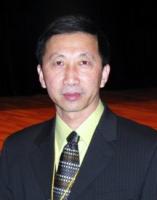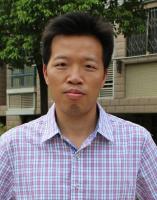
Jian-Zhong Sun, Ph.D., Distinguished Professor
Title: Ph.D. / Distinguished professor
Gender: Male
Work Phone: 0511-88796122
Affiliation/position: Director, Biofuels Institute, School of The Environmental and Safety Engineering, Jiangsu University, China
E-mail: jzsun1002@ujs.edu.cn; or 2745983694@qq.com
Business Address: 301 Xuefu Road, P. O. Box 63#, Jiangsu University, Zhenjiang, 212013, Jiangsu, China
n Education
1998-01-2002-05, Ph.D., Louisiana State University, USA
Major: Entomology, Minor: Statistics/Microbiology
1982-09-1985-07, M. S., Nanjing Agricultural University, China
Major: Entomology
1982-09-1985-07, B. S., Nanjing Agricultural University, China
Major: Plant Protection
n Work Experience
July 2009—Present,
Employer: Jiangsu University, China
Position or Title: Distinguished professor at School of the Environmental and Safety Engineering, Jiangsu University,
Director of Biofuels Institute, Jiangsu University, China
Adjunct professor, Washington State University, USA
August 2004—June 2009,
Employer: Costal Research and Extension Center, Mississippi State University, USA
Location: 1815 Popp’s Ferry Rd. Biloxi, MS,USA
Position or Title: Assistant professor, PhD student advisor
January 2002—August 2003,
Employer: Louisiana State University, USA
Location: Baton Rouge, 70803, Louisiana,USA
Position or Title: Postdoctoral associate
May 1996—December 1997
Employer: Louisiana State University, USA
Location: Baton Rouge,70803,Louisiana,USA
Position or Title: Senior research scientist
July 1992—April 1996
Employer: Jiangsu Academy of Agricultural Sciences, China
Location: No.50 Zhongling Street,Xuanwu District, Nanjing, China
Position or Title: Associate professor
February 1991—May 1992
Employer: Auburn University, Alabama, USA
Location: Auburn, Alabama 36849, USA
Position or Title: Visiting scientist
August 1985—January 1991
Employer: Jiangsu Academy of Agricultural Sciences, China
Location: No.50 Zhongling Street,Xuanwu District, Nanjing, China
Position or Title: Assistant professor
n Research interests/areas
l Develop advanced technologies for biomass conversion and utilization that include biomass recycling, reuse, and recovery, uniquely by the biological conversion pathway.
l Reveal and Mimic highly efficient natural lignocellulolytic conversion systems (e.g. wood-feeding termites or other cellulose-feeding animals) to advance current bioreactors for biofuels and bioproducts, e. g. Natural Inspired Technology.
l Develop dedicated bioenergy crops and the associated technologies for biofuel industries; primarily focus on cell wall modification as well as the foreign lignocellulase gene clone and expression in plant.
l Develop the advanced technologies for biomass-based plastics and other bio-products, particularly focused on the lignocellulosic material development that can apply to 3D printing technology.
l Develop the advanced technologies for Microbial Fuel Cell that primarily focuses on the cellulose utilization, as well as some biosensors for environmental monitoring.

Yang-Chun Yong, Ph.D., Professor
Education:
2009, Ph.D., Biochemical Engineering, East China University of Science and Technology
2004, B.S., Bioengineering, Huazhong Agricultural University
Working experience:
2012 -Present, Professor, Jiangsu University
2010-2012, Research Fellow, Nanyang Technological University , Singapore
2009-2010, Lecturer, Huazhong Agricultural University
Main Research Interests:
1. Electron based biorefinery—eBiorefinery: To Power and Feed the World with Waste! (Microbial fuel cell (extracellular electron transfer mechanism; nanostructured electrode; electrochemical active biofilm); Microbial electrosynthesis (CO2 capture & transformation); Microbial synthesis of functional nanomaterials).
2. Intelligent Microbiology—iMicrobe: To Delight and Reprogram the Life with Microbe! (Intelligent microbe & microbial intelligence).
3. Biosensors (Whole cell biosensors for high-throughput, high sensitive, high selective detection/quantification of pollutants & toxins).

Jian-xiong Jiang, Ph.D., Professor
Education:
1995.09—2000.09: Ph.D. in Crop Science, Hunan Agricultural University, China;
1991.09—1995.06: B.S. in Horticulture, Hunan Agricultural University, China
Working Experience:
2014.03—present: Professor, Biofuels Institute, Jiangsu University, China;
2011.03—2011.10: Visiting Scholar, Plant Gene Expression Center, UC-berkeley, USA;
2010.11—2014.02 Professor, Miscanthus Institute, Hunan Agricultural University, China;
2002.12—2010.10 Associate Professor, Miscanthus Institute, Hunan Agricultural University, China;
2000.10—2003.05: Post-doctor, National Key Laboratory of Crop Genetics & Germplasm Improvement, Nanjing Agricultural University, China.
Research Interests:
1. Germplasm evaluation of bioenergy grass crops (Miscanthus, Arundo, Pennisetum, etc.) and exploration of their elite gene resources;
2. Genetic improvement and breeding on biomass yield, salt tolerance ability and lignocellulose degradability for bioenergy grass crops through artificial hybridization, cell engineering and genic engineering.
Research Achievements:
1. The Miscanthus species distributions were investigated in China, and more than 1,000 accessions of wild germplasms were collected for further research. Morphological characters, fertility, chromosome ploidy, self-incompatibility level of these Miscanthus germplasms were evaluated.
2. The chloroplast genomes of M. sinensis and M. sacchariflorus were sequenced. A set of chloroplast SSR (cpSSR) and nuclear SSR (nSSR) markers were developed and used to evaluate genetic diversity and phylogeny of Miscanthus species and to identify true hybrids out of cross offspring.
3. Extensive natural hybridization events between Miscanthus species were discovered based on morphological and molecular evidences. A strategy for utilizing the interspecific heterosis in Miscanthus was developed, and based on which three elite Miscanthus hybrid cultivars were produced and authorized.

Weilan Shao, Ph.D., Distinguished professor
Education:
1982, B.S., Plant protection, Nanjing Agricultural University
1985, M.S., Plant pathology, Nanjing Agricultural University
1993, Ph.D., Microbiology, University of Georgia , USA
Working experience:
1994 -1997, Post-doc., UW, UCSD;
1997-1999, Research associate, Scripps Research Institute, USA
2000-2002, Distinguished professor, Wuxi University of Light Industry, China
2002-2012, Distinguished professor, Nanjing Normal University , China
2012 -, Distinguished professor, Jiangsu University , China
Main Research Interests:
Molecular microbiology and pathway engineering for cellulosic ethanol fermentation;
Methodology of gene cloning, expression, directed evolution and regulation;
Molecular engineering for biomedical proteins and lignocellulases.

Jun Liu, Ph.D., Professor
Academic qualification
09. 2012 - 09. 2016 |
Ph.D. in Chemical Engineering Laboratory of Wood and Paper Chemistry Åbo Akademi University, Åbo/Turku, Finland |
09. 2009 - 03. 2012 |
Master of Science in Engineering Tianjin Key Laboratory of Pulp and Paper Tianjin University of Science & Technology, Tianjin, P. R. China |
09. 2005 - 07. 2009 |
Bachelor of Science in Engineering Tianjin University of Science & Technology, Tianjin, P. R. China |
Work experience
2017.08-now Jiangsu University,Biofuels Institute,Professor
2016.07-2017.07 Uppsala University,Sweden. Post-doctoral fellow
2016.06-2016.07 Uppsala University,Sweden. Visiting research
2015.04-2015.07 Paper and Fibre Research Institute (PFI), Norway. Visiting research
2013.01-2013.05,2013.10 KTH Royal Institute of Technology, Sweden. Visiting research
Research Interest
3D printing:Development of biomass-based materials as 3D printing feedstocks for potential application in biomedicine/ pharmacy, fashion, art, apparel, interior and architecture products.
Biocomposites:Biocomposites (thin films, hydrogels, and aerogels) based on nanocellulose and polysaccharides for potential tissue engineering, wound healing, and drug delivery application.
Polysaccharides:Extraction, functionalization and structural profiling of plant-polysaccharides (hemicellulose).